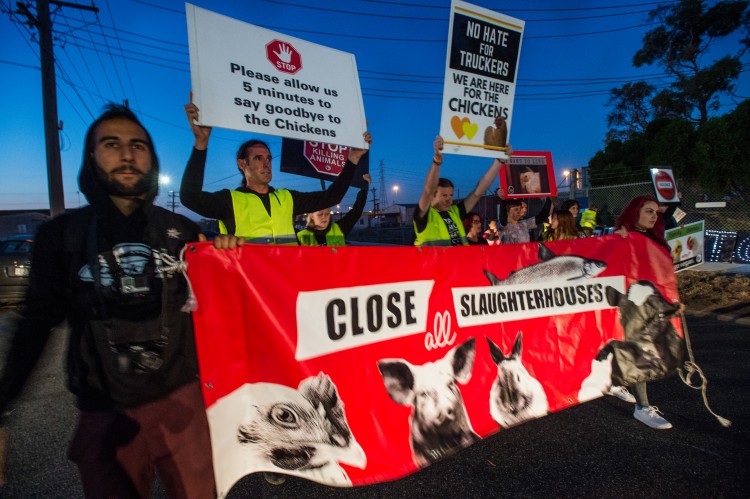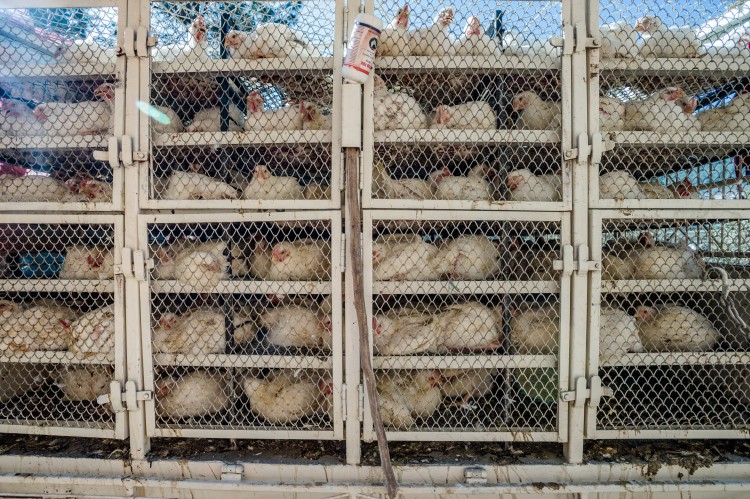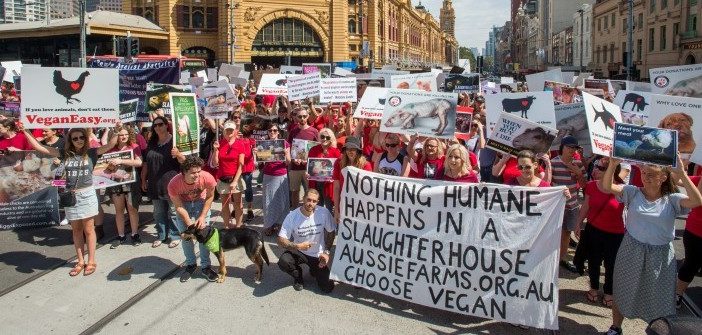One distinction we can make in all sorts of initiatives that are making a difference for farm animals is the distinction between non-profit initiatives (basically activism or advocacy) and for-profit ones (business). In this article I ask the question if in the light of the incredibly exciting developments in the private sector, the role of advocacy may need to be re-evaluated.
I’ve been in the animal rights/vegan movement for about two decades now. I founded a non-profit in 2000 and saw the rise of many other non-profits. I’ve seen small groups get really big and professional, sometimes counting more than one hundred paid staff and working with a budget of millions of dollars. And then there’s been the rise of organized grassroots activism like Anonymous for the Voiceless, DXE or the Save Movement, as well as the tens of thousands of vegan and animal advocates who are working individually.
For a long time, I thought that all this outreach and advocacy by all these groups and individuals was the most important way to create change for animals. I thought that all this awareness-raising about the plight of animals – with leaflets, videos, websites, newsletters, social media, conferences, podcasts, demonstrations, lobbying, etc. – was sort of all there was. And I certainly never had much doubt about the fact that it was possible to change enough people’s hearts and minds.

A changing playing field
During all this time, there were also commercial initiatives that were selling vegan products that people – vegan or not – were buying. Many of these companies, however, have traditionally been rather small and have often not been overly ambitious, with indeed many of them probably believing that “small is beautiful.” The last five years or so, however, have seen some important new developments in the business world:
- While certainly many of the older, traditional companies are growing faster than before thanks to increased demand, many new startups are distinguishing themselves from the older companies by being more ambitious, more modern, more technological, and often better funded. Think of companies like Just, Beyond Meat, Impossible Foods, to name just the three most famous ones as examples (these are from the United States, but they are in many countries and many sizes).
- We’re seeing more and more interest from investors in this space. Impossible Foods, for instance, has to date raised about four hundred million dollars. The search for the best alternatives to animal products is getting better and better funded. Lewis Bollard of the Open Philanthropy Project mentions 1.7 billion dollars in funding (to companies that actually disclose their funding), by at least different 55 funds that are investing in alternatives to animal products.
- Next to old and new vegan companies, we’re now also seeing big traditional non-vegan food companies or even meat companies getting into this space. They can do this in several ways: developing their own alternatives, acquiring other companies (like Danone acquired Alpro), or investing in other companies (like Tyson invested in Beyond Meat). In the Netherlands, we’re actually seeing the first few meat companies who have announced they will stop producing meat as their plant-based products are now profitable enough!
Time to re-evaluate the role of advocacy?

I can’t be the only person to wonder if, in the light of this exploding commercial interest in alternatives for animal products, the role of the advocacy movement (the non-profit part) will remain the same or should somehow change. And I can’t be the first one to wonder whether advocacy or business will make the biggest difference from here on. I’ve seen, for one thing, several people making the move from activism to entrepreneurship, selling burgers where they used to distribute leaflets, activists starting a non-profit that is largely focused on corporate engagement (the Good Food Institute comes to mind), and other non-profits shifting more and more of their focus towards outreach to companies (Proveg International, for instance). Some people who are newer to the cause may also get straight into business, passing any activist stage whatsoever.
Personally, I have been in the non-profit/advocacy part for almost all my “vegan career” (EVA, Proveg International, CEVA), but today I’m also involved in Kale United, a financial startup that wants to support vegan businesses with vegan investments).
Mutual reinforcement
What advocates (call them activists, or whatever) mainly do is to try to shift people’s attitudes about animals. What businesses mainly do is put food (and other) products out there, in the supermarket shelves, for people to hopefully buy and like. Advocates usually think: if I can make them understand what is happening to animals and why it matters, people will change their mind and they’ll buy those products.
This may work, but we know that there is often a huge gap between attitude change and behavior change. I’ve written numerous times about how a change of attitude (about animals and meat) may come easier after a behavior change, i.e. after people have already shifted, to some extent, for whatever reason, towards plant-based products. If this is true – and I’m convinced it is – you can easily see the importance of merely creating great vegan products and making them available everywhere.
In the best case, we might see some kind of virtuous cycle, where people who discover great tasting plant-based foods have an easier time caring about animals, and then consume even more plant-based foods, and eventually may become vegans. (Note that bad vegan food or bad advocacy might turn this virtuous cycle into a vicious one).
Probably, neither behavior change nor attitude change are in themselves enough to create a better world. People may do the right thing, but if they have wrong attitudes, doing the right thing may not be their permanent position and they may start doing wrong things as soon as wrong things become easier or cheaper. Conversely, so many people have the right attitude about something, but are not doing the right thing (you can find many examples for yourself, I’m sure).
That’s why ideally we need both attitude shifts (the main role of advocacy) and behavioral shifts (the main effect of business). Advocacy and business can be seen as mutually reinforcing.

Where should the focus lie?
Still, that advocacy and business might be mutually reinforcing does not necessary mean they create the same kind of impact. While they are probably both necessary, it is quite possible that one has a bigger impact than the other – or that their relative impacts are changing as we progress in time. This is not just an academic question or a pissing contest between entrepreneurs and non-profit activists. Having a sense of the relative impact of either part is important for helping us to make choices: where should our resources go, which careers should people who want to improve the lives of animals choose, etc.
Furthermore, having a sense of the impact of both of the non-profit and for-profit sectors could help us understand how advocacy and business should ideally relate to each other, and to determine possible new roles for advocacy in the context of the ever bigger corporate impact of this movement.
Shift
I can’t help having the feeling that it is business entrepreneurs who are doing a large part of the work that used to be done mainly by activists. And I can see how in the future, that might even be more the case.
Let’s assume, for a moment, that businesses keep producing and selling more vegan products, and that maybe clean clean (lab-grown) meat takes off and becomes a success. Assume that business clearly helps us get closer and closer (indeed very close) to a vegan world. What if anything, should advocates do in such a case? Is there any way in which they should shift their focus? I am not sure about the answer, but here are a few possibilities (of which I have not yet decided which ones I feel confident about and which ones I don’t):
- Advocates could more intensely focus on supporting businesses.
For people used to working in a non-profit context, this may sound like having things upside down. Isn’t it business – with their stream of income – that should support, sponsor, and donate to non-profit initiatives? Sure, but the other direction works too. There are a lot of things, apart from helping creating more awareness and thus more demand, that advocates can do for business, thus increasing their chances of success (we’re assuming that their financial success dovetails with their positive impact for animals). Some of the things that activists, especially non-profit organizations, can do for businesses, especially startups, involve creating awareness among their members and supporters of brands and products, crowdfunding, helping to lobby for legislation that is vegan-business friendly (or challenging to the meat industry), doing PR and being in the media, litigating against offenders, getting people to taste products at events, etc. Companies obviously do many of these things as well, but less so if they’re just starting. Also, there might be credibility issues. A company has a commercial agenda and organizations may sometimes be in a more objective position to lobby. - Advocates could mainly get out of the way. We could choose to trust in a virtuous cycle of supply and demand, where growing demand provides a growing supply, and thus further increases demand as it becomes easier for everyone to shift more and more in the vegan direction. In this sense, once past a certain point, a vegan world or a close-to-vegan-world could become almost an inevitability. Activism then should focus on further reinforcing this trend, as speeding it up by just a single month means a massive reduction in suffering.
- Advocates could focus on closing the gap. Plant-based may become the new norm, but as there may always be bad things that are both legal and profitable, there maybe be no guarantee that business alone would abolish all animal products. So there could be a role for activists in making sure we complete 100% of our mission and a achieve a sustainable state of affairs. Important in this regard is that we help cement new norms and practices in laws and regulations, so that it will be a lot more difficult to ever slide back.
- Activists could go for fairer across the board. Many activists have a lot of concerns about how the whole vegan thing is being commodified and incorporated into the capitalist system. I have been less anti-capitalist than many of my fellow activists so far, because I believe there is no way around this system if want to help animals in the short term. But should our project be highly successful and we manage to replace most animal products by plant products, it would definitely make sense to start focusing on the problematic aspects of capitalism (this is not to say that focusing on this is entirely useless or futile at this point).
Advocates should then make sure vegan products score well on as many accounts as possible. Plant based is not everything, and vegan products may, in addition to being socially unjust, still be unhealthy, ecologically damaging etc. It will be necessary to further perfect our food once most of it is plant based. This does not belong to the core lobbying activities of the animal rights movement, so this role could obviously be played (and is being played) by other organizations and movements. Obviously, unhealthy and unsustainable foods will also exist in other systems than capitalism, but it is easy to see how the present system encourages, or doesn’t penalize, such negative trends and tendencies. - Advocates could focus on awareness raising and attitude change. Advocates do what they do for the cause that they believe in. Entrepreneurs may be motivated by the same causes, but in addition many of them are also motivated by profit (this applies even more to the investors, although part of them might be impact investors). I don’t consider motivations incredibly important at this point in time (it’s fine for me if people do the right thing for less than the ideal reasons), but I do agree that if we want sustainable change, where the risk of a reversal is minimized, we ideally want everyone to care about animals. I believe that once our society is mostly plant-based for whatever reason, it will be a lot easier to see that animals have interests and to install regulation to protect them, so that there is no going back. Still, there would undoubtedly be room for further awareness-raising on this topic.
- Vegans and activists could consider investing instead of donating, and spend their time making money instead of advocating. As investing in a company, as opposed to donating to a non-profit, may yield a financial return, and as companies are doing great things for animals, one could argue that investing is a better option than donating, even more so if one opts to donate the return on the investment. Given the amounts of money being invested in the private sector, however, it could be argued that a bigger difference can be made by donating than by investing, at this point. This argument was also made by Lewis Bollard in the aforementioned newsletter.
- Vegans and animal rights people could shift their focus more towards the suffering of animals in the wild, as they might be the first ones to take this topic seriously.
Some preliminary conclusive thoughts
Advocacy and business need each other. We can assume (though we can’t be certain) that vegan/animal rights activists have, with their efforts, helped raise demand for meat and dairy alternatives (even though surveys show that animal rights is still ranks very low among people’s motivations for buying meat alternatives), thus helping to create a market for companies. Conversely, when animal rights and vegan groups advocate against animal products, they need to be able to present alternatives. The more available and better these alternatives are, the more effective and convincing advocacy will be. So the relationship is a mutually reinforcing one.
There will always be a need for advocacy. Advocacy is mainly directed at making people change their attitudes. Yet changed attitudes are not sufficient, as even in a world where almost everyone agrees that something is bad, bad things still happen. We need changed minds and easily accessible alternatives – that’s where business comes in.
In the light of the increasing role business is playing, we may have to start thinking about the possible changes in the role and shapes of advocacy in the future. I don’t have the answers to this question, but I feel fairly confident that the relationship between advocacy and business should be, at this point, mainly collaborative and supportive, rather than confrontational.
Featured image: Demonstrators in Melbourne’s March To Close All Slaughterhouses. How should this type of activism relate to vegan businesses? Image credit Jo-Anne McArthur / We Animals.





